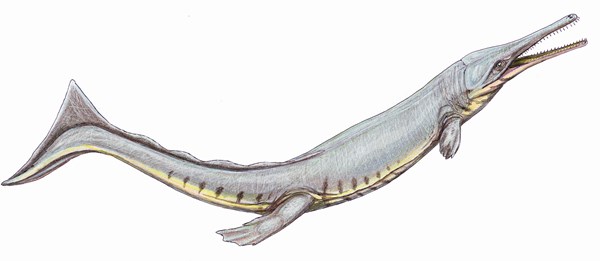Deadly prehistoric crocodiles mimicked the shape and senses of whales and dolphins to dominate Jurassic seas, new research has found.
The extinct crocodiles, thalattosuchia, evolved from their land-living ancestors to become fast swimming predators.
Experts from the University of Edinburgh have also found they adapted a part of the inner ear, responsible for balance and equilibrium, as they gradually adjusted to their new ocean home 170 million years ago.
Paleontologists analysed CAT scans of more than a dozen fossil skulls to examine the vestibular system of the inner ear, which comprises of three looping semicircular canals and helps with balance and spatial awareness.
As thalattosuchia made their first steps into the water, during a long semi-aquatic phase, their ear canals became markedly fatter and smaller – a shape that made the sensory system less sensitive and one shared with dolphins and whales.
Scientists said this canal shape is better suited to life in the oceans, where buoyancy can hold up an animal, as compared to land, where animals need a highly sensitive sense of balance to cope with gravity and complex landscapes.
A similar change occurred independently in whales.
It is thought that each species mimicked each other’s changes during this period of adaptation.
Julia Schwab, a PhD student in the University of Edinburgh’s School of GeoSciences, who led the study, said: “Sensory organs such as the inner ear are key to understand how ancient animals lived.
“We found that marine crocodile relatives have a very unique inner ear shape, similar to other water-living reptiles and today’s whales.”
It seems like the crocs and whales took similar but different evolutionary routes from land to water
Experts said the findings also show the crocodiles’ sensory systems evolved in response to their new deep-water environment, rather than driving them into it.
Dr Steve Brusatte, also of the School of GeoSciences and senior author on the study, said: “The ancient aquatic crocs developed unusual inner ears after modifying their skeletons to become better swimmers.
“Whales also changed their ears in a similar way, but did it soon after entering the water.
“It seems like the crocs and whales took similar but different evolutionary routes from land to water.”
The study, published in Proceedings of the National Academy of Sciences (USA), was supported by a grant from the Leverhulme Trust.
It involved a team of scientists from around the world, including colleagues from the National Museum of Scotland.





























